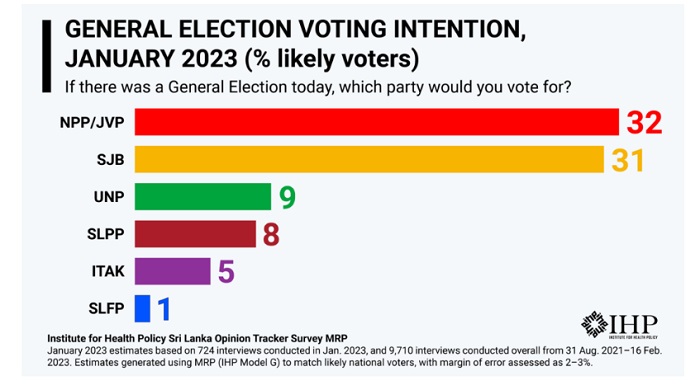
The National People’s Power (NPP) / Janatha Vimukthi Peramuna (JVP) and the Samagi Jana Balawegaya (SJB) are running neck-and-neck in the General Election voting intentions amongst likely voters, the Sri Lanka Opinion Tracker Survey (SLOTS) polling from January 2023 shows.
According to the latest survey by the Institute for Health Policy (IHP), General Election voting intentions amongst likely voters are at 32% and 31% each respectively, following a surge by the NPP/JVP during December and January.
Both are ahead of the Sri Lanka Podujana Peramuna (SLPP), United National Party (UNP) and Sri Lanka Freedom party (SLFP), but the difference between them is within the margin of error.
IHP MRP analysis of likely voters indicates that since July 2022 when President Ranil Wickremesinghe took office, the SJB has gained a net three points, the NPP/JVP one point, and the UNP five points.
The survey stated that these gains have been largely at the expense of the SLPP whose support fell 11 points.
Assuming general election voting intent transfers to voting in local authority elections due in March, the SLOTS January polling suggests that on current trends the SJB and the NPP/JVP between them will win the plurality in most local authorities and wards.
However, most local authorities are likely to end up with divided control, with no party winning an absolute majority. The SJB and ITAK will lead the NPP/JVP in the Northern and Eastern provinces, but the NPP/JVP will likely lead the SJB in the Western, Southern, North-Central, and Sabaragamuwa Provinces, and will do better in rural areas, whilst the SJB will do better in urban and municipal councils.
Dr Rannan-Eliya, lead investigator and Executive Director of IHP, commented that “This will be a huge change from the 2018 local elections. The main drivers are a collapse in the SLPP vote, and the NPP/JVP doing better than the SJB in winning defecting SLPP voters and in retaining their original 2020 General Election vote.”
The NPP/JVP has a clearer lead over the SJB amongst registered voters, but SJB supporters are more likely to vote, reducing the margin between them in likely voters by 2%.
Full report : http://ihp.lk/publications/docs/SLOTSReport202303.pdf (NewsWire)
